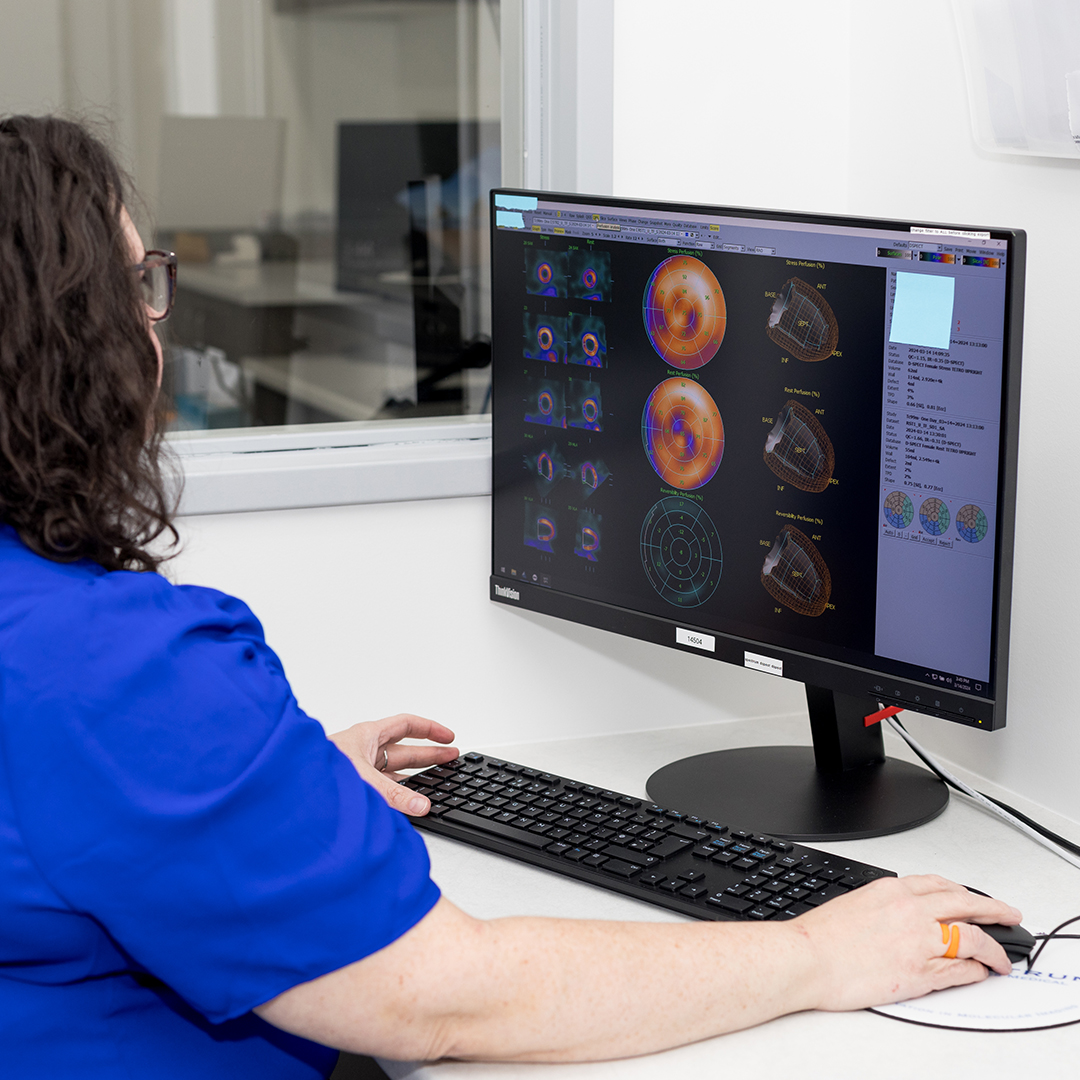- Identify reduced blood flow to the heart muscle (ischemia).
- Evaluate chest pain that may be associated with coronary artery disease (a blockage in the vessels of your heart muscle).
- Determine the effectiveness of a bypass or angioplasty.
- Check the effectiveness of medications such as BP and antiarrhythmics.
- Assess exercise/functional capacity.
- Identify reasons for shortness of breath.
Nuclear Cardiology
MIBI (Myocardial Perfusion Imaging)
Why Have a MIBI test?
What will happen at my appointment?
When you arrive at the department, a qualified staff member (Nurse, Nurse Practitioner or Cardiovascular Technologist) will bring you into the preparation room and explain the entire test. They will answer any questions you may have and ask you to sign a consent form.
They will then prepare you by putting stickers on your chest to monitor your heart and place an IV into your arm for the injection of the radioactive tracer.
If you are not walking on the treadmill, the IV will also be used to inject medication to stress your heart.
If we perform the stress test using medication, you WILL NOT be required to exercise.
You will be injected with a small amount of radioactive material by the nuclear medicine technologist. Images of your heart will then be taken as you sit comfortably on a chair. The camera does not move and does not cover any part of your head or face. The radioactive injection will not cause you to be sick in any way and has no known harmful effects.
After the rest images are completed, you will have the stress portion of the test.

Persantine (Dipyridamole)
Stress Prep:
****NO CAFFEINE or DECAFFEINATED DRINKS FOR 24 HOURS PRIOR TO TEST***
FLUIDS: ONLY PLAIN WATER FOR 24 HOURS PRIOR TO TEST
FOOD: NOTHING TO EAT FOR 4 HOURS PRIOR TO TEST (2-hour fasting for people with diabetes is okay)
MEDICATION:
- Nitrates – (Nitro patch, isosorbide mono/di-nitrates) Hold for 12 hours before your appointment time
- Hydralazine- Hold for 12 hours before your appointment time
- Cialis or Viagra- Hold for 48 hours before your appointment time
- Medication with caffeine (Tylenol 1,2,3, non-drowsy cold meds, migraine meds, etc.)
- Hold for 24 hours before your appointment time
Treadmill Prep:
- Hold Beta Blockers and Calcium Channel Blockers (including Amlodipine) for 48 hours
- Wear comfortable shoes and pants (females – no dresses)
Treadmill Stress Test:
For the stress part of the test, you will walk on a treadmill. It will start slowly and gradually increase in speed and incline every three minutes. The goal is to reach your target heart rate. The amount of time you walk on the treadmill is different for every patient and depends on your age, ability to exercise, and starting heart rate. You will be asked to exercise for as long as you can, pushing yourself to get the best possible results. It is normal for your heart rate, blood pressure, breathing, and perspiration to increase.
A registered cardiovascular technologist, nurse or nurse practitioner will be at your side throughout the test to monitor your pulse, blood pressure, and ECG.
If any changes in your blood pressure, heart rate, or something similar concern the staff, they may stop the test immediately.
If at any time during the test, you feel unwell in any way, tell the staff. When you are at peak exercise, the nuclear medicine technologist will inject another small amount of radioactive material to identify the blood flow to your heart during stress. After the injection, you are to walk for one more minute so that the radioactive material can circulate, after which the treadmill will be slowed to a stop.
Medication Stress Test:
For the stress part of the test, you will lay on a bed, and a medication called Persantine will be injected into your IV slowly over 4 minutes. You may experience some side effects, such as headache, dizziness, chest discomfort, abdominal discomfort, nausea, or a warm flushing sensation. These effects are temporary and only last for a few minutes.
After the injection of the medication, the nuclear medicine technologist will inject another small amount of radioactive material to identify the flow of blood to your heart during stress.
If your symptoms persist, an injection of a medication that quickly reverses any side effects of the persantine can be given.
A second set of images will be taken after the stress test.
If you are planning to cross the border within 2 days after your test, a letter can be provided to you to give to border security. You will be in the department for a maximum of 3 hours.
FAQ:
How do I get the results of my test?
Your test results will be available for your next appointment with the physician who ordered the exam.

